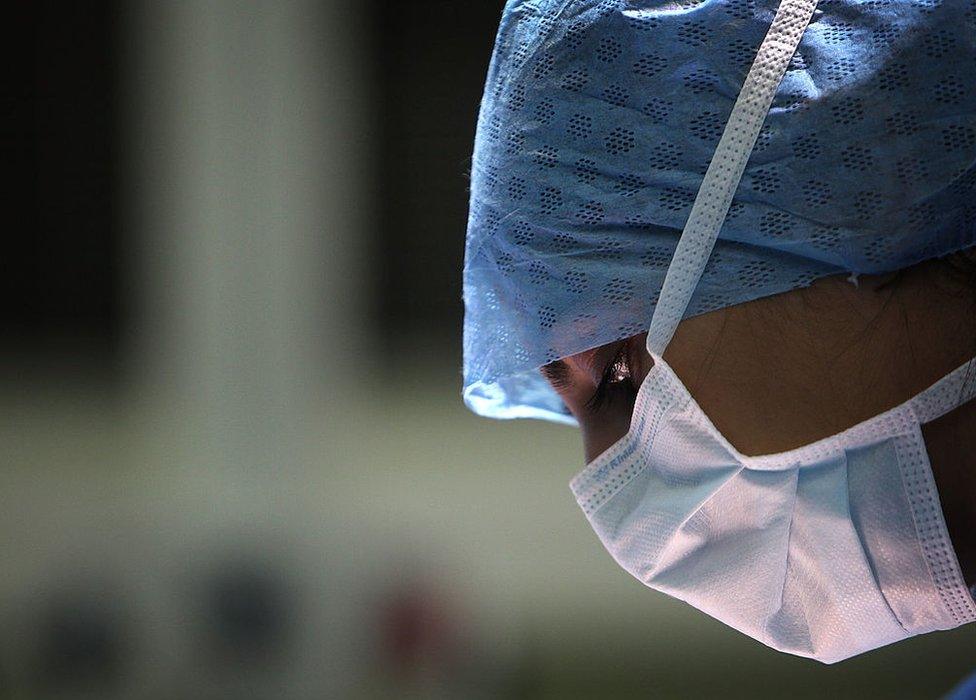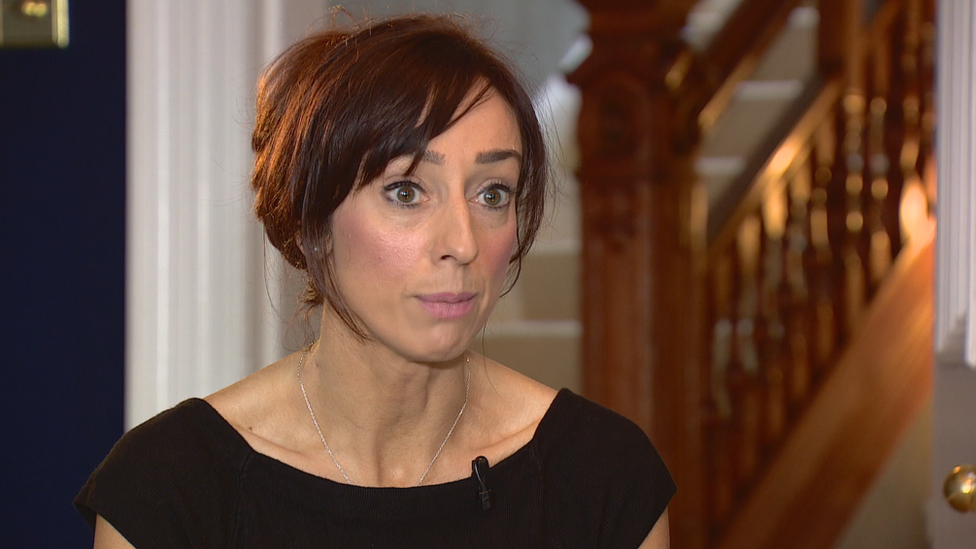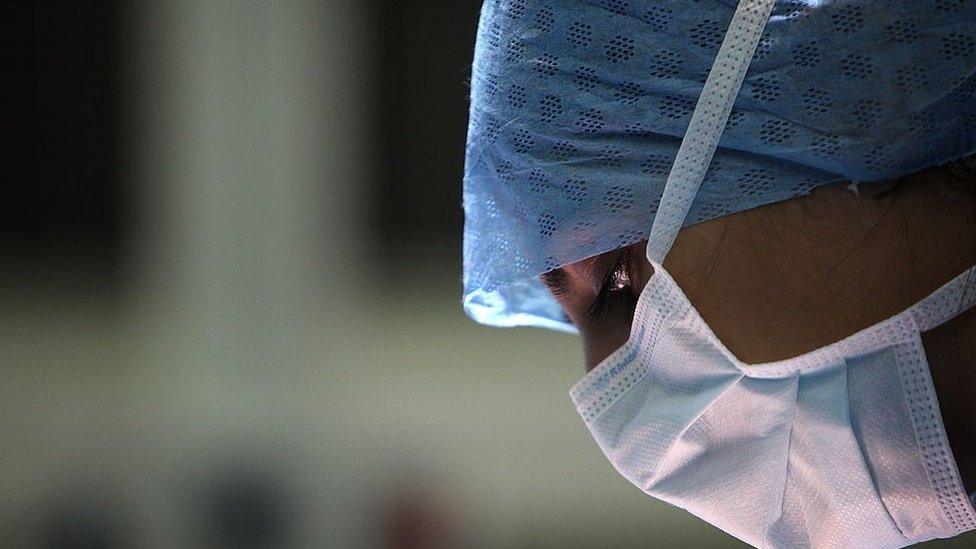Highest paid Scottish doctors are mainly men
- Published
- comments

Scotland's top earning senior doctors are overwhelmingly men, BBC research has found.
The figures showed just 15 out of 100 of the highest-paid consultants across Scotland's health boards were women.
The Freedom of Information data suggested just two of Scotland's NHS boards had as many as three women among their top 10 highest-paid medics.
At least two boards - NHS Borders and NHS Ayrshire and Arran - have no female consultants among their top 10 earners.
All 14 NHS regional health boards in Scotland were asked to provide the information but four did not reply or would not provide a breakdown.
NHS Orkney, NHS Fife and NHS Tayside said they risked identifying individual consultants if they provided the information. NHS Western Isles did not respond.
Among the remaining 10 Scottish health boards the top 10 earning consultants were:
NHS Ayrshire and Arran - 10 male and 0 female
NHS Borders - 10 male and 0 female
NHS Grampian - 9 male and 1 female
NHS Greater Glasgow and Clyde - 9 male and 1 female
NHS Lothian - 9 male and 1 female
NHS Dumfries and Galloway - 8 male and 2 female
NHS Forth Valley - 8 male and 2 female
NHS Lanarkshire - 8 male and 2 female
NHS Highland - 7 male and 3 female
NHS Shetland - 7 male and 3 female
The British Medical Association said the medical workforce was almost equal in gender numbers but women remained under-represented in senior roles.
It called for more support for women and flexibility in career progression.
The Royal College of Surgeons of Edinburgh said historically there were very few female consultants but that was slowly changing.
Female consultants
The Scottish Freedom of Information data showed that the earnings of the highest-paid senior doctors varied across health boards from £285,000 in NHS Ayrshire and Arran to £139,000 in Shetland.
They were spread among many different medical disciplines, with general surgery and anaesthetics particularly well represented.
Glasgow has just one female consultant among its top 10 highest-paid consultants but she was the top earning medic in the health board. Her speciality was not revealed in order to protect her identity.
The data pointed to a small differential in the average basic pay, with men being paid about £93,790, up to 4% more than women.
However, this widened to almost 20% when overtime and bonuses were included.

'Maybe no-one is advising them or encouraging them'

Dr Mackay said more could be done to help women
Dr Vanessa Mackay, a consultant in obstetrics and gynaecology, said some of the reason for fewer women reaching senior leadership positions could be attributed to the fact that traditionally more men were doctors.
She said: "If that is the simple reason then we should see a rapid decline in the gender pay gap with some specialties quoting between 30% and 60% female staff on the middle grade, just down from consultant level."
However, Dr Mackay said there were other issues, such as the impact of women's "care-giver duties".
"Some of the difference might be down to male consultants working longer hours and doing overtime but definitely women are not well-represented at senior leadership level," she said.
"Perhaps women are not being given the same opportunities to apply for these jobs," Dr Mackay said.
"Maybe no-one is advising them or encouraging them."
"Maybe women do need a little bit more leadership training and mentoring so they do feel empowered to apply for them.
"Maybe we need to change the senior positions and design them better. I think that's something the NHS needs to think about now."

Career progression
BMA Scotland's consultants committee chairman Simon Barker said: "While the medical workforce is today almost gender equal in numbers, there remains significant under-representation of women in senior roles that is particularly pronounced in certain specialties.
"There is also strong evidence that doctors who work less-than-full-time experience greater challenges in career progression, which has a disproportionate impact on women.
"When women do reach consultant grade posts, it is still the case that they find it more difficult to access additional sources of income on top of their basic contracted hours, such as additional locum or out of hours work, research projects and discretionary points."
He said the NHS in Scotland could be doing "significantly more" to support employment choices and flexibility in career progression.
Dr Barker said: "There is clearly still a long way to go in addressing the obstacles that too many women still face in their medical careers and it is only by confronting the problem head-on that further progress will be made."
More transparent
Dr Judy Evans, honorary secretary for the Royal College of Surgeons of Edinburgh, said: "Consultants are often in post for more than 20 years.
"The contracts for any job in the NHS are completely gender neutral.
"The pay gap reflects the fact that historically there were very few female consultants."
Dr Evans said: "It takes a long time for these figures to change, but we are on the way.
"Nowadays most specialities report between 30% and 60% females in post in the middle grades of trainees.
"When these doctors finish training, then the percentage of female consultants will increase."
She added: "The old process for awarding bonuses was also very flawed, and was challenged in industrial tribunals.
"Modern processes are much more transparent. However, there is still room for improvement."
Gender pay gap
The NHS as a whole has been publishing gender pay gap data since 2015.
Each health board publishes its own figures and they are not collated across the whole of Scotland.
However, research by Wladyslaw Mejka, who runs the equalities campaign group Equality Here Now, said the gap between men and women's average wage was almost 20% in the latest NHS statistics, published last year.
The numbers are calculated by comparing the average hourly pay of women with the average hourly pay of men.
The results suggest that there are many more men in senior positions than women throughout NHS Scotland.
Additional reporting by Patrick Cowling
- Published16 February 2018
